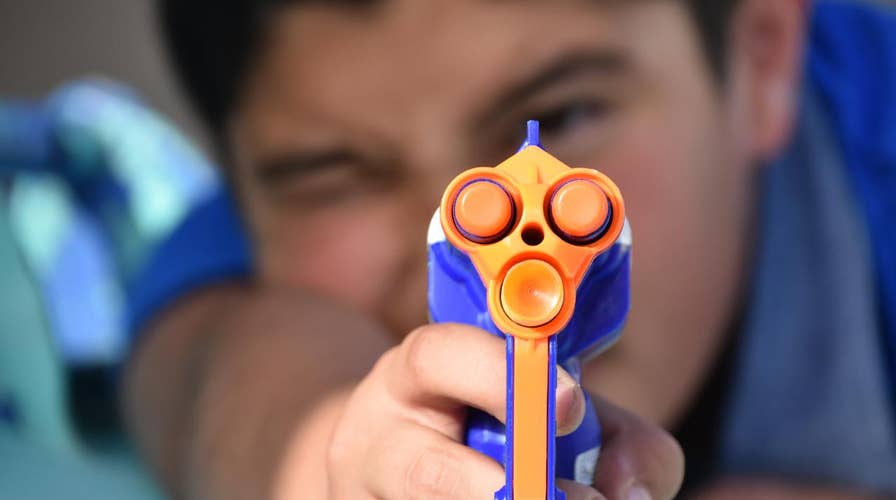Nerf guns can cause serious eye injuries, doctors warn
Doctors in London are warning parents about the dangers posed by Nerf guns after treating several eye injuries
Parents might want to keep Nerf guns away from their children.
Doctors from Moorfield Eye Hospital in London are warning people about the popular Hasbro toy after three patients were treated for traumatic hyphema, internal bleeding in the eye, after being hit with Nerf gun bullets, a report published by British Medical Journal said on Monday.
In one case, a child shot a man, 32, in the eye while standing 26 feet away. The man suffered blurred vision and a red eye, Sky News reported. Another 43-year-old woman was hit with a bullet from three feet away, causing blurred vision and a red, sore eye.
The youngest patient, an 11-year-old boy, suffered swelling in the outer and inner layer of his right eye when he a Nerf bullet hit him from about six feet away.
NAVAL HOSPITAL REMOVES STAFF SEEN IN INAPPROPRIATE PICTURES WITH NEWBORNS
Though all three people made a full recovery, doctors are worried the toys can cause long-term vision loss.
"This case series emphasizes the seriousness of ocular injury from NEerf gun projectiles and calls into consideration the need for protective eyewear with their use,” the report stated. "It also calls for reconsideration of the safe age limits for Nerf gun use in children."
Nerf blasters are made for children 8 years old or older, though one product allows 5-year-olds to use it. Hasbro said in a statement to Fox News its toys were tested for safety and fun and that Nerf foam darts and foam rounds shouldn’t pose as a concern when they’re used properly.
“Consumers must never aim NERF blasters at a person’s eyes or face, should only use the foam darts and foam rounds designed for specific NERF blasters, and never modify darts or blasters,” a Hasbro spokeswoman said on Tuesday.
She also addressed unbrand Nerf guns that doctors are also concerned about because the bullets can be made with a harder material.
TREE PULLED DOWN BY HAMMOCK NEARLY PARALYZES WOMAN
“There are darts available to buy claiming to be NERF compatible, however these darts are not NERF-branded and may not meet safety standards and regulations,” the spokeswoman said.
“Ultimately, a parent or caregiver knows his or her child best and is best equipped to make decisions on what forms of play and entertainment are most appropriate for his or her child,” she added.

